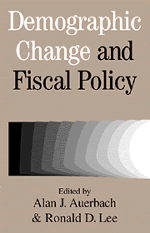Book contents
- Frontmatter
- Contents
- List of Figures
- List of Tables
- Contributors
- Acknowledgments
- 1 Introduction
- 2 Population Forecasting for Fiscal Planning: Issues and Innovations
- 2-1 Comment
- 2-2 Comment
- 3 Uncertainty and the Design of Long-Run Fiscal Policy
- 3-1 Comment
- 3-2 Comment
- 4 How Does a Community's Demographic Composition Alter Its Fiscal Burdens?
- 4-1 Comment
- 4-2 Comment
- 5 Social Security, Retirement Incentives, and Retirement Behavior: An International Perspective
- 5-1 Comment
- 5-2 Comment
- 6 Aging, Fiscal Policy, and Social Insurance: A European Perspective
- 6-1 Comment
- 6-2 Comment
- 7 Demographics and Medical Care Spending: Standard and Nonstandard Effects
- 7-1 Comment
- 8 Projecting Social Security's Finances and Its Treatment of Postwar Americans
- 8-1 Comment
- 9 Demographic Change and Public Assistance Expenditures
- 9-1 Comment
- 9-2 Comment
- Index
4-1 - Comment
Published online by Cambridge University Press: 03 February 2010
- Frontmatter
- Contents
- List of Figures
- List of Tables
- Contributors
- Acknowledgments
- 1 Introduction
- 2 Population Forecasting for Fiscal Planning: Issues and Innovations
- 2-1 Comment
- 2-2 Comment
- 3 Uncertainty and the Design of Long-Run Fiscal Policy
- 3-1 Comment
- 3-2 Comment
- 4 How Does a Community's Demographic Composition Alter Its Fiscal Burdens?
- 4-1 Comment
- 4-2 Comment
- 5 Social Security, Retirement Incentives, and Retirement Behavior: An International Perspective
- 5-1 Comment
- 5-2 Comment
- 6 Aging, Fiscal Policy, and Social Insurance: A European Perspective
- 6-1 Comment
- 6-2 Comment
- 7 Demographics and Medical Care Spending: Standard and Nonstandard Effects
- 7-1 Comment
- 8 Projecting Social Security's Finances and Its Treatment of Postwar Americans
- 8-1 Comment
- 9 Demographic Change and Public Assistance Expenditures
- 9-1 Comment
- 9-2 Comment
- Index
Summary
A simple examination of local government expenditures shows that there is significant variability in the level and composition of expenditures across localities. In this chapter, Thomas MaCurdy and Thomas Nechyba examine how demographics affect the fiscal burden of communities and what role central governments can play in compensating local areas for fiscal burdens. To examine this question, the chapter develops a model of fiscal federalism and explores the implications of the model in an empirical analysis of the expenditures and finances of California counties.
This model of fiscal federalism has three components. Local areas engage in providing public goods, such as education, safety, and infrastructure. Each area chooses allocations for public goods by maximizing a social welfare function subject to its budget constraint, which incorporates the links between demographics and the costs of providing local public goods. Individuals, who have preferences for public and private goods, decide where to locate, taking into account the package of taxes and local public goods across areas. If there are no spillovers (over time or space), then a local government can reach the social optimum by using benefit taxes. The authors then discuss how the presence of expenditure spillovers can lead to underprovision of the public good. They define the fiscal burden of a community as the total valuation of the public good (for both residents and nonresidents of the community) over and above the current populations' willingness to pay for the local public good.
- Type
- Chapter
- Information
- Demographic Change and Fiscal Policy , pp. 149 - 154Publisher: Cambridge University PressPrint publication year: 2001
- 1
- Cited by



